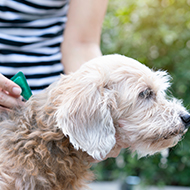NOAH responds to recommendations on parasiticide use

'Preventive use [of paraciticides] has a very important place for those parasites which are present all year round and for pets that are at risk of exposure to these' - NOAH.
The National Office of Animal Health (NOAH) has responded to new recommendations on the responsible use of parasiticides for cats and dogs.
The BVA, BSAVA and British Veterinary Zoological Society (BVZS) joint position was published in October following concerns over the impact of parasiticides on the environment and the threat posed by resistance to common companion animal parasiticides.
It recommends that the VMD review the requirements for environmental impact assessments of companion animal products and to also reconsider the classification of parasiticides that are available without professional advice.
In its response, NOAH agrees that veterinary professionals should avoid the blanket treatment of parasiticides but warns that failure to prevent certain parasites could have a negative impact on animal welfare.
The statement reads: 'It is important to differentiate between blanket treatment and legitimate and necessary treatment use for prevention purposes. Preventive use has a very important place for those parasites which are present all year round and for pets that are at risk of exposure to these.
'The consequences of failing to prevent certain parasites can have a high cost, not only to pets and their welfare but also to pet owners due to the distress caused, with possible consequences for the human-animal bond, which has proven particularly beneficial in recent times.'
The BVA/BSAVA/BVZS joint position also includes a suggestion that less frequent treatment intervals may help to reduce the impact of parasiticides on the environment. It adds: 'There are risks on both sides – not treating animals could lead to an animal or public health concern, but the potential harm to the environment must also be taken very seriously.'
In its response, NOAH states: 'If the interval between treatments is extended beyond what is required by the regulatory authorities (VMD) on the licence then the efficacy of the product cannot be guaranteed, and lapses in parasite protection could occur with the possibility of poor parasite control as a result.
'We are seriously concerned by the suggestion that treatment intervals be arbitrarily extended and wish to remind veterinary surgeons of their fundamental responsibility to adhere to legally approved and defined product labels when prescribing.'
NOAH concludes: 'NOAH supports science and continued research into the risks and benefits of effective control of parasites that are potentially dangerous to animals and people alike.



 The Veterinary Medicines Directorate (VMD) is inviting applications from veterinary students to attend a one-week extramural studies (EMS) placement in July 2026.
The Veterinary Medicines Directorate (VMD) is inviting applications from veterinary students to attend a one-week extramural studies (EMS) placement in July 2026.